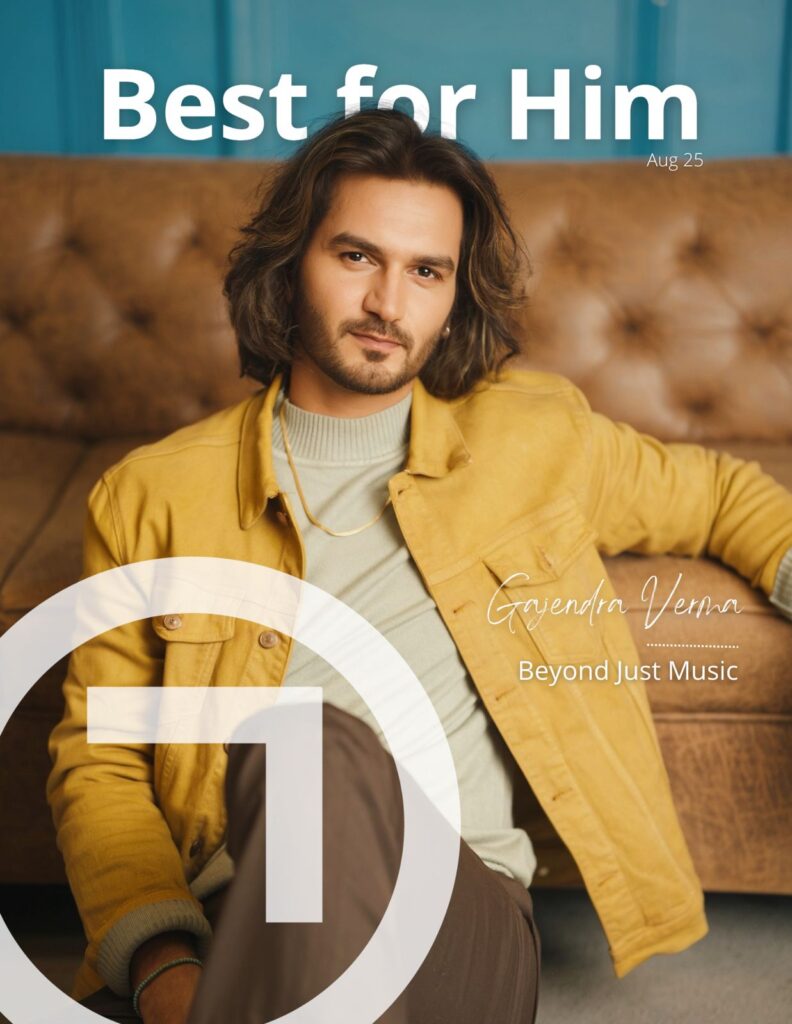From “Emptiness” to emotional evolution, Gajendra Verma has lived every shade of fame, heartbreak, and healing through his music. In this candid conversation, he opens up about handling overnight success, redefining masculinity, staying grounded amidst fame, and finding strength in vulnerability. As he reflects on the lessons of heartbreak, balance, and self-awareness, his words reveal a man who has grown beyond the spotlight—someone who now seeks peace, purpose, and hope through every song.

“Emptiness” changed your life overnight—how did you handle sudden fame at such a young stage in your career?
Honestly, I wasn’t prepared for it. Everything happened so fast, and there wasn’t a blueprint to follow. But I kept reminding myself why I started music. That grounding helped me stay focused even when things got overwhelming.
Do you ever feel pressure to live up to the massive expectations that came after your breakthrough song?
Yes, there’s always some pressure. But over the years, I’ve learned to treat it more like responsibility than stress. I can’t chase another “Emptiness” or “Tera Ghata.” I can only keep making music that feels true. That’s the only way I know how to do it.
What keeps you grounded and humble in an industry where fame can easily get to one’s head?
Family. Friends. Real people. I split time between work and spending quiet time with people who knew me before the numbers came in. Also, I avoid the social media scroll trap. I think the more you’re present in real life, the easier it is to stay grounded.
How has your idea of masculinity evolved over the years—both as an artist and as a man?
Growing up, masculinity was often about hiding emotions. But music taught me the opposite. Now I see strength in vulnerability in being honest about what you feel, what you fear, what you love. That shift has changed me deeply, both personally and artistically.
Many of your songs touch on vulnerability. Do you think men today are becoming more comfortable expressing emotions?
I think we’re getting there, slowly. There’s still a long way to go, but the conversation is happening. Through music, I try to contribute in my own small way to say, “It’s okay to feel. It’s okay to not have it all figured out.”
What role does self-awareness play in balancing your personal and professional life?
It’s everything. The more honest you are with yourself, your limits, your triggers, your patterns, the better you manage both worlds. Without self-awareness, you burn out or lose your way. I check in with myself often, even if it’s just in silence.
How important is fitness and physical well-being for you as a performer?
Very. Performing live demands a lot of stamina, breath control, and energy. I’ve realized that taking care of my body helps me deliver better, and it also helps with mental clarity. It’s all connected.
Do you follow any rituals—whether gym, yoga, or meditation—that keep you mentally and physically fit?
I keep it simple. Light workouts, a lot of walking, some breathing practices, and quiet time without screens. Travel and nature also help me reset. I don’t follow any strict schedule, but I listen to what my body and mind need.
Your music often speaks to loneliness. How do you personally deal with moments of isolation?
I let myself feel it. Sometimes we try to run away from loneliness, but it has a lot to teach. I write, I play, I sit with it. And I reach out to people I trust when it gets too much. Music is my main companion in those moments.
Do heartbreaks fuel your creativity, or do you find it hard to channel personal pain into art?
Heartbreaks have definitely shaped my songwriting. But I don’t force the process. Sometimes it flows, sometimes I need space before I can write about it. But yes, pain has a strange beauty; it cracks you open in ways that bring out something true.
What advice would you give to young fans who are struggling with heartbreak for the first time?
Feel it. Don’t rush to “move on.” It’s okay to break, it’s okay to cry. Just don’t lose sight of who you are. You’re not what someone did or didn’t do; you’re your own story, and this is just one chapter.
Do you think being an artist makes relationships harder or more meaningful?
Both. It makes things intense because you feel everything deeply. But it also makes relationships richer if the other person understands your rhythm. Balance is key. Art can’t come at the cost of connection.
What role does music play in your own healing process when life gets overwhelming?
It’s my mirror and my medicine. I don’t just make music, I talk to myself through it. Sometimes I don’t even realise I’m healing until the song is done. It’s my safe space, always.
How do you balance the need for personal space with the demands of fans and the industry?
I’ve become better at setting boundaries over the years. I give my energy fully when I’m on stage or in work mode, but I also disappear when I need to. Fans are usually very understanding when they know it’s coming from a place of self-care.
If “Emptiness” spoke to heartbreak, what emotion or theme do you want your future songs to represent most strongly?
Hope. Growth. Reflection. I think we’ve all seen enough pain, especially in recent years. I want to write more about healing now, not ignoring the pain, but learning how to walk with it.